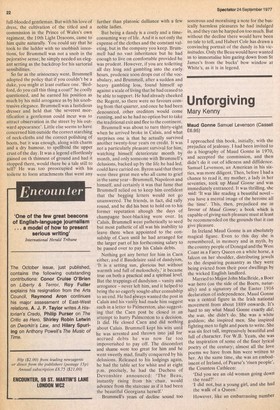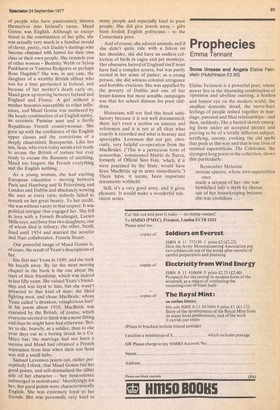Unforgiving
Mary Kenny
Maud Gonne Samuel Levenson (Cassell £6.95) I approached this book, initially, with the prejudice of jealousy. I had been invited to do a biography of Maud Gonne in 1970, and accepted the commission, and then didn't do it out of idleness and diffidence. Samuel Levenson, an American in his sixties, was more diligent. Then, before I had a chance to read it, my mother, a lady in her seventies, took up Maud Gonne and was immediately entranced. It was thrilling, she said: 'It was like reading a beautiful novel — you have a mental image of the heroine all the time'. This, then, prejudiced me in favour of Maud Gonne; a book which is capable of giving such pleasure must at least be recommended on the grounds that it can give pleasure.
In Ireland Maud Gonne is an absolutely magical figure. Even to this day she is remembered, in memory and in myth, by the country people of Donegal and the West Coast as a Faery Queen on a white horse, a falcon on her shoulder, distributing jewels to the despairing peasantry as they were being evicted from their poor dwellings by the wicked English landlord.
Married to Major John MacBride, a Boer war hero (on the side of the Boers, naturally) and a signatory of the Easter 1916 declaration of independence, Maud Gonne was a central figure in the Irish national movement from about 1889 onwards. It's hard to say what Maud Gonne exactly did; she was, she didn't do. She was a white goddess; she inspired men. She inspired fighting men to fight and poets to write. She was six feet tall, impressively beautiful and full of character. For W.B. Yeats, she was the inspiration of some of the finer lyrical poetry of the century; almost all the love poems we have from him were written to her. At the same time, she was an embodiment of Ireland, of Pearse's 'risen people', the Countess Cathleen: 'Did you see an old woman going down the road?'
'I did not, but a young girl, and she had the walk of a Queen.'
However, like an embarrassing number of people who have passionately thrown themselves into Ireland's cause, Maud Gonne was English. Although so exceptional in the combination of her gifts, she was actually very much in a familiar mould of clever, pretty, rich Daddy's darlings who become obsessed with hatred for their own class or their own people. She reminds you of other woman – Beatrice Webb or Sylvia Pankhurst or Vanessa Redgrave or perhaps Rose Dugdale? She was, in any case, the daughter of a wealthy British officer who was for a time garrisoned in Ireland, and because of her mother's death early on, Maud grew up moving between Ireland and England and France. A girl without a mother becomes susceptible to other influences, and Maud Gonne was mothered by the heady combination of an English nanny, an eccentric Parisian aunt and a fierily Republican French countrywoman. She grew up with the confidence of the English upper classes and the convictions of a deeply chauvinistic Bonapartist. Like her son, Sean, who even today seems ever ready to accuse the British of torture but ever ready to excuse the Russians of anything, Maud too forgave the French everything and the English nothing.
As a young woman, she had exciting European education – moving between Paris and Hamburg and St Petersburg and London and Dublin and absolutely wowing the men at every turn; nobody failed to remark on her great beauty. To her credit, she was without vanity in that respect. It was political intrigue that engaged her. She fell in love with a French Boulangist, Lucien Millevoye, and bore him two daughters, one of whom died in infancy; the other, Iseult, lived until 1954 and married the novelist and Nazi collaborator, Francis Stuart.
Our powerful image of Maud Gonne is, of co urs, the result of Yeats's descriptions of her.
She first met Yeats in 1889, and she took his breath away. By far the Most moving chapter in the book is the one about the start of their friendship, which was indeed to last fifty years. She valued Yeats's friendship and was loyal to him, but she wasn't attracted to that kind of man; she liked fighting men, and chose MacBride, whom Yeats called 'a drunken, vainglorious lout' in his poem about 1916. MacBride was executed by the British, of course, which everyone seemed to think was a more fitting end than he might have had otherwise. Better to die, bravely, as a soldier, than to eke your days out as a boring drunk in a Co. Mayo bar; the marriage had not been a success and Maud had obtained a French separation from him when their son Sean was still a small baby.
Samuel Levenson points out, rather perceptively 1 think, that Maud Gonne hid her good points, and self-dramatised the sillier side of her character – ter benevolence submerged in melodrama'. Mortifyingly for her, her good points were characteristically English. She was extremely loyal to her friends. She was personally very kind to many people and especially kind to poor people. She did give jewels away – gifts from foolish English politicians – to the Connemara poor.
And of course, she adored animals, and if she didn't quite ride with a falcon on her shoulder, she did have an endless collection of birds in cages and pet monkeys.. Her obsessive hatred of England itself must have had a complex source, but was partly rooted in her sense of justice; as a young person, she did witness colonial arrogance and horrible evictions. She was appalled by the poverty of Dublin and one of her lesser-known but most sensible campaigns was that for school dinners for poor children.
Historians will not find this book satisfactory because it is not well documented; there isn't even a section on sources and references and it is not at all clear what exactly is recorded and what is hearsay and apocrypha. Levenson did not get, obviously, very helpful co-operation from the MacBrides. (`This is a pernicious form of censorship,' commented Mairin 'de Burca, formerly of Official Sinn Fein, 'which, if it were practised by the State, would have Sean MacBride up in arms immediately.') There ha've, it seems, been important documents withheld.
Still, it's a very good story, and it gives pleasure. It would make a wonderful television series.



































 Previous page
Previous page